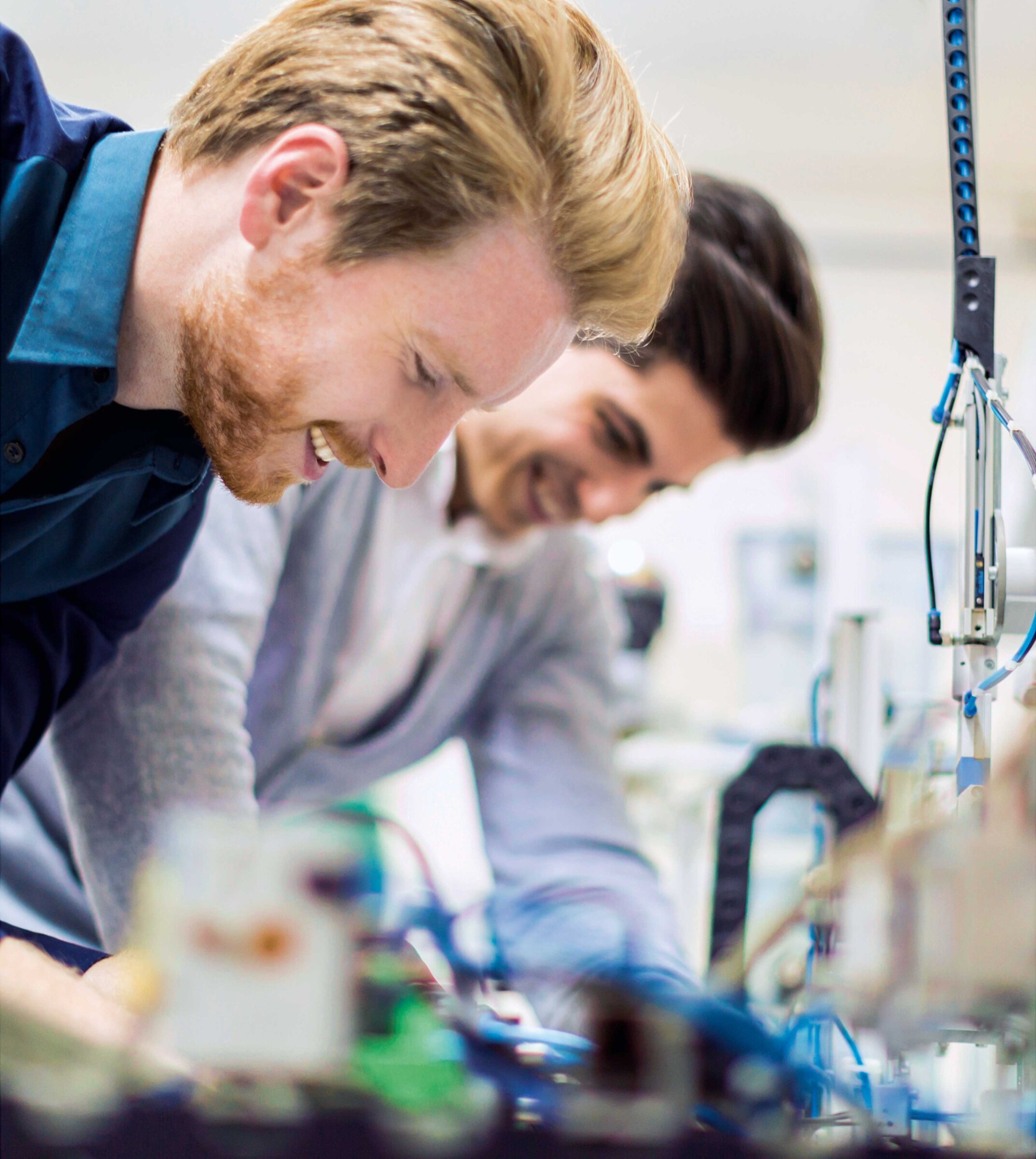
Everyone’s talking about Industry 4.0. There are plenty of ideas on what could be done; there are also very different projects underway in a number of companies; and there are the first specific instances of practical implementation in industry. One thing is certain: the fourth industrial revolution is on its way. As with all far-reaching changes, there will be winners and losers. Which side of the divide small and medium-size enterprises will find themselves on is impossible to tell at present.

Huge potential for savings of costs and energy
The all-pervasive digital networking of machines and plant will transform the entire value chain right through to the product. An obvious benefit is the huge potential for cost and energy savings. However, these new forms of production will pose severe technological, safety-related and legal challenges for companies. To successfully master them, companies need plenty of new expertise and hard-working and highly skilled employees. Many small and medium-size enterprises are still no way near exploiting the potential of digitisation and networking in production. It is not only the faith in the superiority of the human mind that puts many people off concerning themselves with the subject in depth and investing early on in suitable projects. Some will also say “Our business is unsuitable”, “We haven’t got the capacity or resources,” or “We can’t get suitable staff”.
At the same time, one cannot generalise about small and medium-size businesses. A closer examination will reveal huge differences in progress with digitisation. It becomes obvious that many firms lack the solid technological foundation on which to build Industry 4.0. Yet, the future belongs to intelligent production, and companies will have to adjust to the demands of the marketplace.
Without practical assistance, the path to networking in production will be stony. This is a realisation that the Deutsche Angestellten-Akademie (DAA) (German White-Collar Academy) and a number of forward-thinking machine and software producers have come to, prompting them to set up the “360° toolmaking” training factory at Innovationszentrum (Innovation Centre) Fennel (IFZ) in 2015. Among the founding companies is Mitsubishi Electric Europe B.V., which has been making advanced wire EDM equipment available.
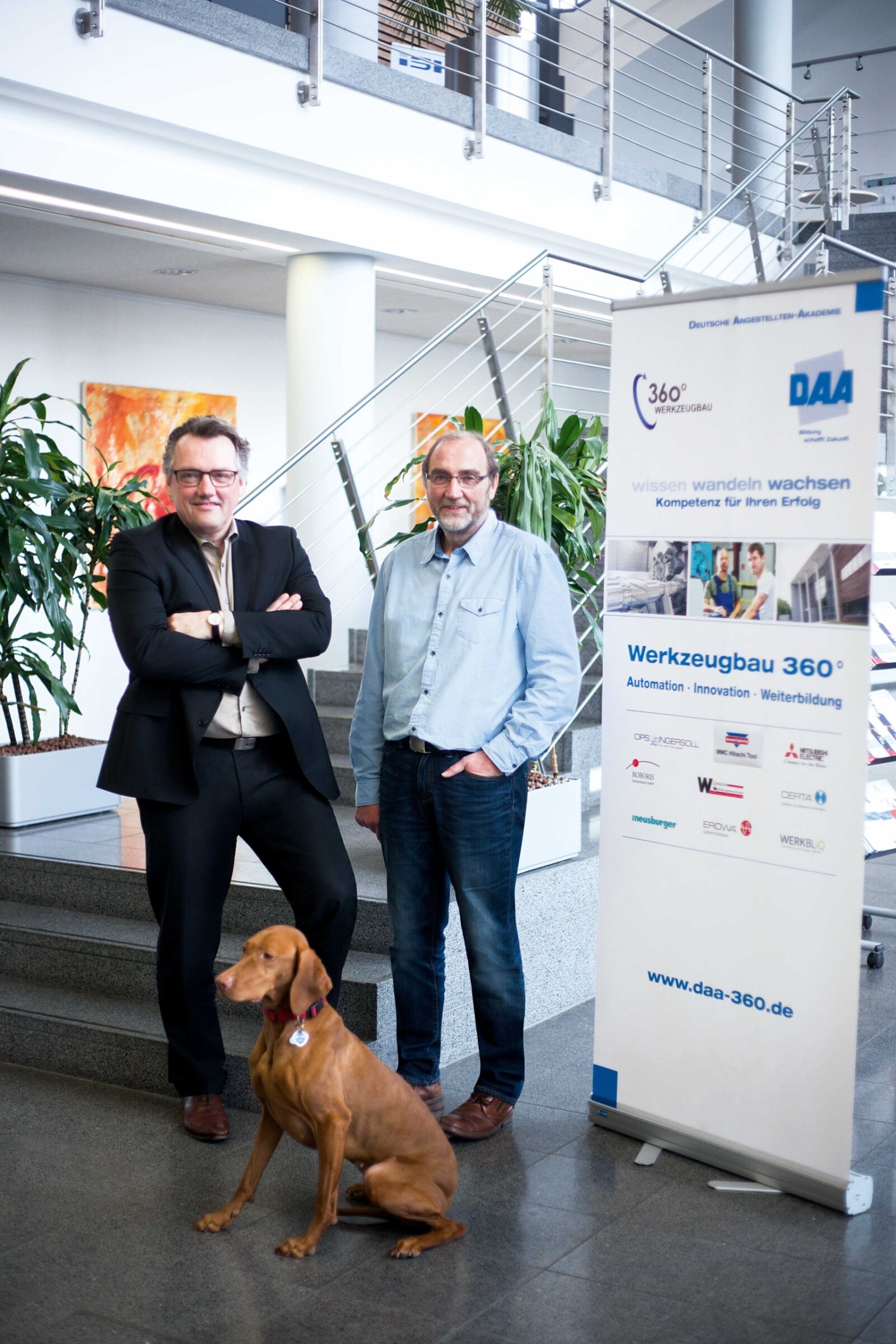
The IZF team includes not only Jörg Schlüpmann and Carsten Böhmert, but also the ever cheerful Nala.
With the aid of this initiative in the form of a “teaching factory”, business owners and employees can gain a hands-on idea of their own personal Industry 4.0. Because Industry 4.0 is a concept that has to be adapted to the needs of each company. Networking is the key concept here. It’s a question of taking the first steps in establishing communication between machines. “Many companies are interested in how they can achieve intelligent solutions today with the aid of interlinked technologies,” explains DAA’s Jörg Schlüpmann, director of the training factory for 360° toolmaking. Small and medium-size businesses are looking not so much for the grand showcase of the future, but for practicable implementation strategies.
This is where 360° takes its cue. “Under realistic practical conditions, we demonstrate how digitally interlinked production works, what the benefits of it are and also what challenges automatically come with it. At our training factory, we teach the expertise that employees need for working in the interlinked environment of the future,” says Schlüpmann.
Intelligent solutions with the aid of interlinked technologies
Reputable machine manufacturers, software developers, component suppliers and service providers have pooled their resources under the auspices of IZF in Bad Oeynhausen in replicating all the steps of production systems of the future. DAA is the promoter, networker and developer of further-training products that can advance the 360° initiative. IZF replicates exemplary production processes, covering everything from CAD-CAM, machine tools and injection moulding machines to handling and packaging robots.
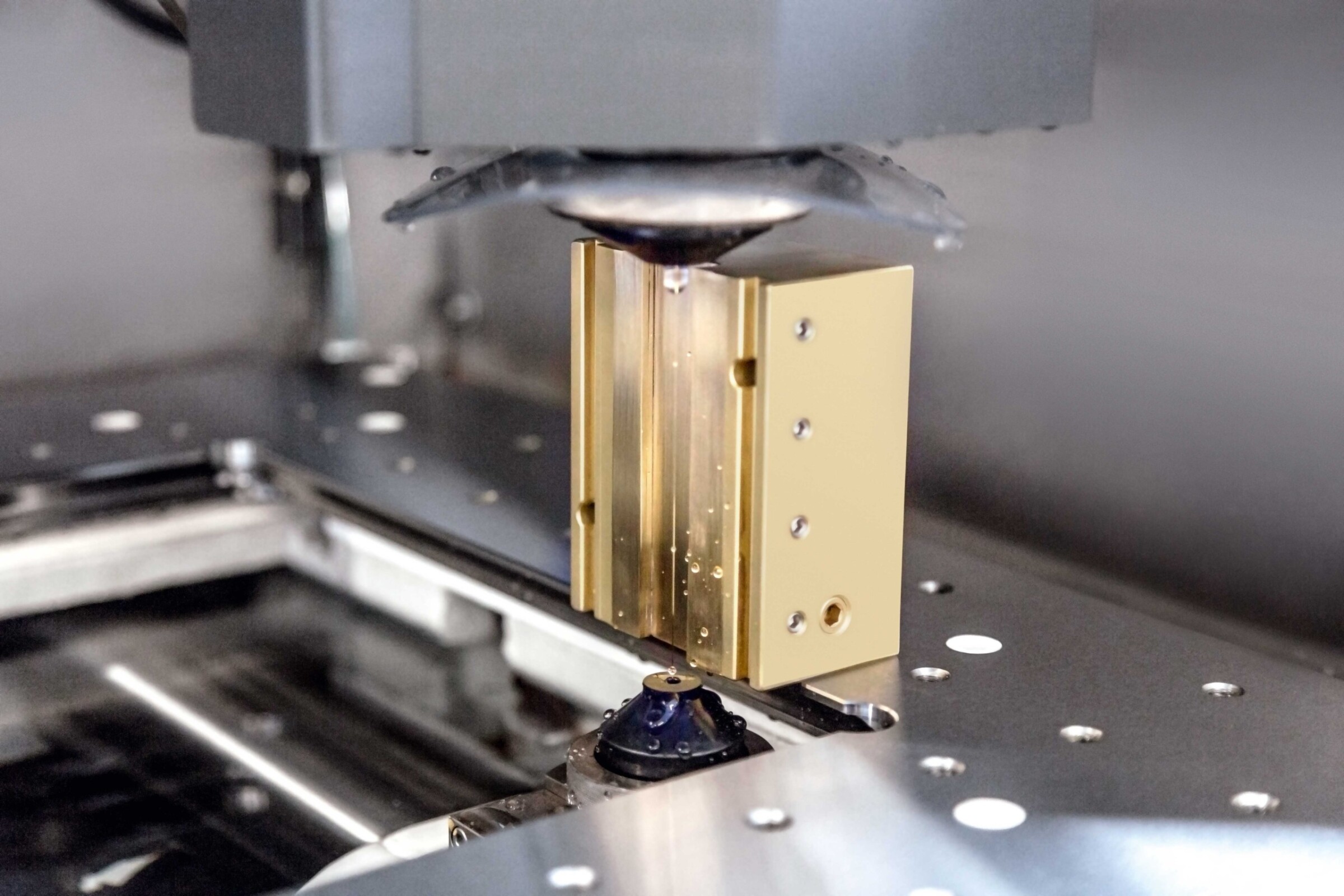
During practical training, the employees work on specific jobs from everyday operations.
For all the participating companies, it is significant that the machines and products are shown operating not only in isolation, but interlinked. In all cases, the very latest technology is employed. This way, IZF can demonstrate how to interconnect and control machines and processes, how to integrate handling and loading robots and how to make efficient use of job management systems. Schlüpmann is keen to stress that, “we have selected machines and systems that are geared to run profitably in small and medium-size enterprises”. IZF is a seal of quality for all the partners, who attach great importance to upgrading their existing technology at regular intervals. Mitsubishi Electric thus installed the latest MV1200R in Bad Oeynhausen in March of this year.
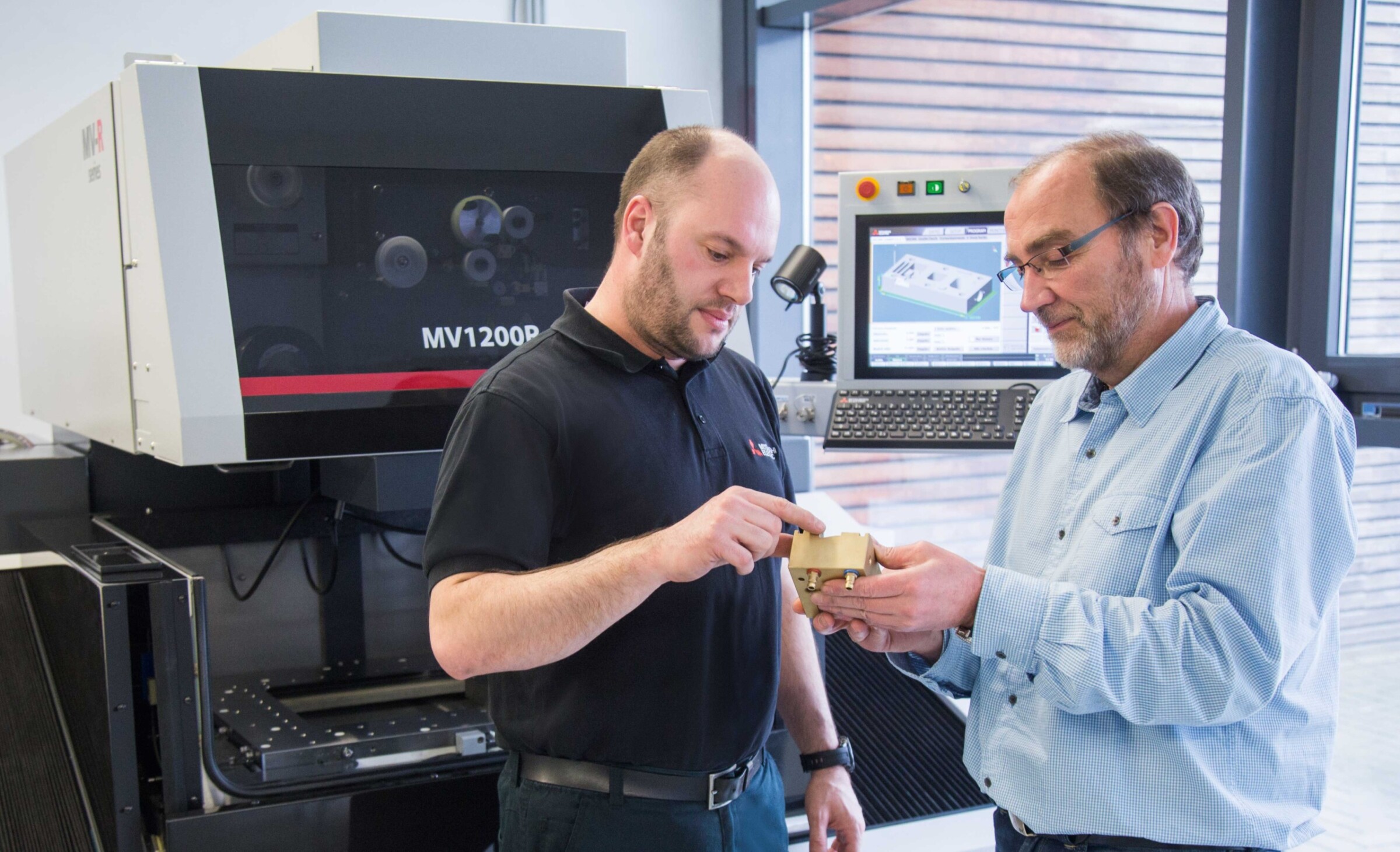
The hands-on experience is writ large at the training factory.
Practical experience as in everyday industry
“To secure the future of Germany as an industrial location, it is essential to establish and expand high-tech training. It is therefore important to talk to the government of North-Rhine/Westphalia and other cost-covering institutions about financing. For if the region wants high-tech training, it will have to participate financially,” Schlüpmann insists. But IZF scores not only with its equipment, but also with the building and its conspicuous modern architecture. It offers customers of the training factory a suitable setting for acquainting themselves with the topics of the future. At the same time, it gives manufacturers a showcase for presenting and demonstrating their machines outside the trade fair circuit. The “work-in-progress” showroom has been well received by many customers. IZF also has prestigious conference and training facilities that can be made available to its partners. “When setting up IZF, we deliberately opted for a ‘training factory’ format,” Schlüpmann reports. “We want an atmosphere like that in everyday production. What we have here is applied technology that produces small series of single-figure batches. So we’re not competing with the market.” The practical training is geared to skilled employees wishing to extend their skills in certain areas or to acquire basic technological knowledge. The training courses usually last a week. An important point for Schlüpmann is that: “We give our customers a training guarantee. In other words, the course takes place on the given date even if only a single participant registers.” Cost is also a key issue of industrial further training. In addition to the course fees, it is the time off work that has to be paid for. This is why the DAA is planning to have all of its courses certified by the summer 2017 so that they are also eligible for funding by the Employment Agency (see “WeGebAU” box). IZF aims to regularly upgrade its curriculum, and the subjects of data security and data protection will be prominent on the agenda. “Control and programming will also enjoy much higher priority in future,” says a convinced Schlüpmann, adding: “The next generation of machine controls will be intuitive controls, as familiar from tablet computers and smartphones, and employees will work in project teams.”
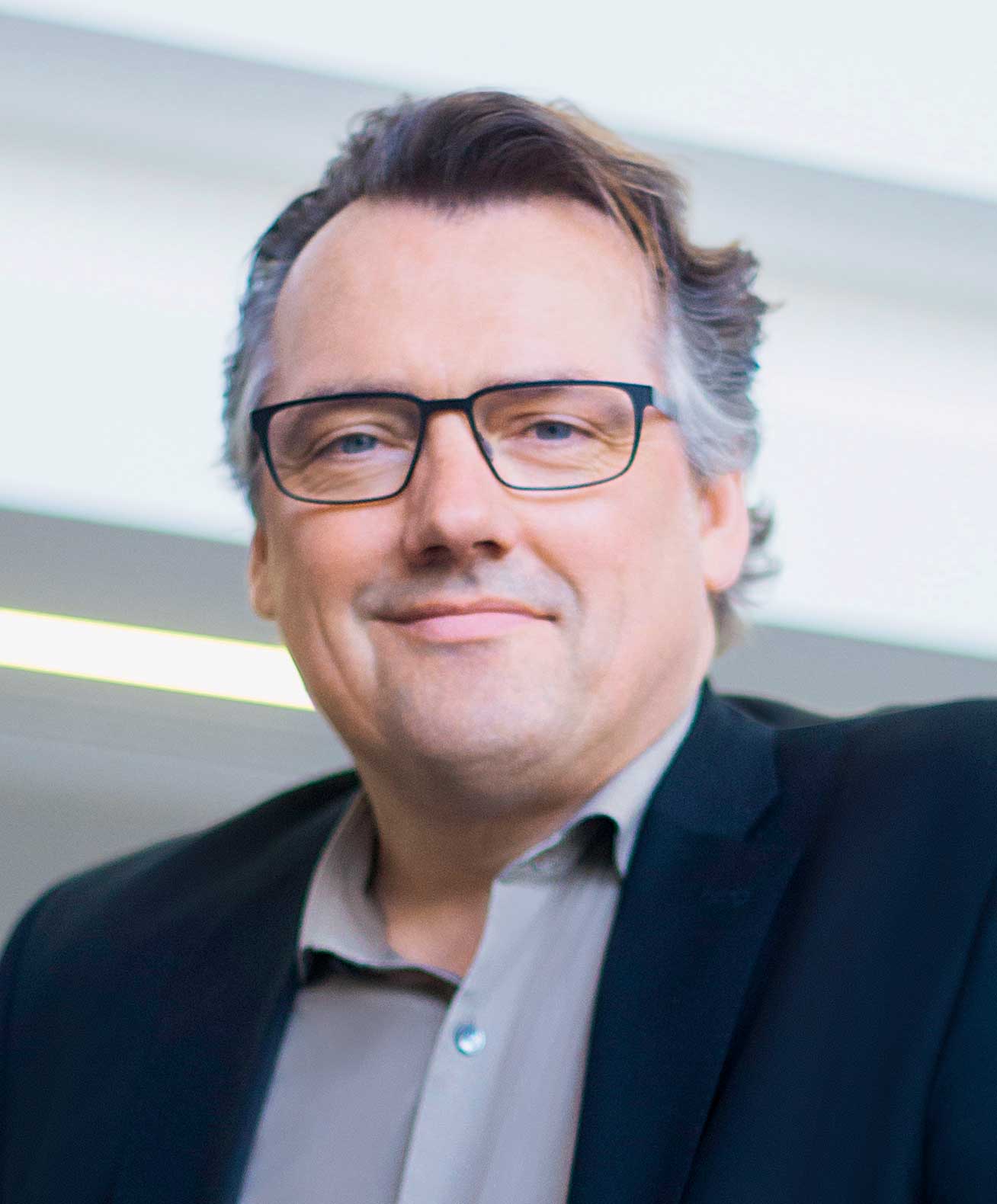
Jörg Schlüpmann Deputy Branch Director of DAA Westphalia
Under realistic practical conditions, we demonstrate how digitally interlinked production works, what the benefits of it are and also what challenges automatically come with it. At our training factory, we teach the expertise that employees need for working in the interlinked environment of the future.
The Deutsche Angestellten-Akademie (DAA) is one of the biggest further training establishments in Germany. With over 3,500 employees and over 300 customer centres, it has been serving the whole country for over 60 years.
Its services include further training for people in employment as well as retraining and further training for job seekers and rehabilitees. Over 6 million participants have so far improved their career prospects by attending DAA courses.
With its WeGebAU programme, the Employment Agency funds further training in the context of existing employment relationships. Here it is a question of upskilling employees of small and medium-size businesses (SMEs) with less than 250 workers. The scale of funding depends on the business size and on the employee’s skills and age. In the best case, the Employment Agency covers 100 % of the cost of further training and up to 75 % of the cost of releasing the employee from his job duties. It advertises the relatively unknown programme with: “Have you got employees with potential for greater challenges? If so, act now by making use of the WeGebAU programme to raise your employee’s skills to the latest level.”
Name and place of company:
360° im Innovationszentrum Fennel (IZF) – a company of Deutschen Angestellten-Akademie (DAA) Westfalen
Germany
Founding year:
2016
Deputy Branch Director of DAA Westphalia:
Jörg Schlüpmann
Number of employees:
1500
Core business:
Initial and further training – vocational foundation and training institution at the interface between industry and society
360° im Innovationszentrum Fennel (IZF) – a company of Deutschen Angestellten-Akademie (DAA) Westfalen
IFA Gruppe
Buddestrasse 11
32547 Bad Oeynhausen, Germany
Tel +49 (0)5731 3030340
Fax +49 (0)5731 3030340
info.badoeynhausen@daa.de
www.daa-360.de
Fields marked with a * are mandatory.
Mitsubishi Electric Europe B.V.
German Branch
Mitsubishi-Electric-Platz 1
D - 40882 Ratingen
Sales
Tel.: +49 (0)2102 / 486 - 6120
edm.sales@meg.mee.com
Service
Tel.: +49 (0)2102 / 486 - 7600
edm.hotline@meg.mee.com
Applications
Tel.: +49 (0)2102 / 486 - 7700
edm.applikation@meg.mee.com
Spareparts
Tel.: +49 (0)2102 / 486 - 7500
edm.parts@meg.mee.com